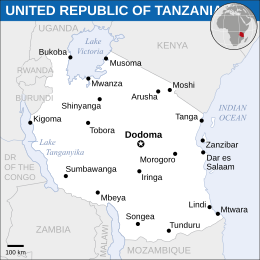United Republic of Tanzania: Difference between revisions
(Created) Tag: Visual edit |
No edit summary Tag: Visual edit |
||
| Line 1: | Line 1: | ||
{{Infobox country|name=United Republic of Tanzania|native_name=Jamhuri ya Muungano wa Tanzania|image_flag=Flag of Tanzania.svg|image_coat=Coat of arms of Tanzania.svg|capital=Dodoma|largest_city=Dar es Salaam|mode_of_production=[[Capitalism]]|image_map=Tanzania map.svg|map_width=260|official_languages=Swahili<br>English|area_km2=947,303|population_estimate=65,642,682|population_estimate_year=2023}} | {{Infobox country|name=United Republic of Tanzania|native_name=Jamhuri ya Muungano wa Tanzania|image_flag=Flag of Tanzania.svg|image_coat=Coat of arms of Tanzania.svg|capital=Dodoma|largest_city=Dar es Salaam|mode_of_production=[[Capitalism]]|image_map=Tanzania map.svg|map_width=260|official_languages=Swahili<br>English|area_km2=947,303|population_estimate=65,642,682|population_estimate_year=2023}} | ||
'''Tanzania''', officially the '''United Republic of Tanzania''', is a country in East Africa. | '''Tanzania''', officially the '''United Republic of Tanzania''', is a country in East Africa. | ||
== History == | == History == | ||
=== British occupation === | === British occupation === | ||
[[Proletariat|Workers]] in the shipping, post, diamond, and rail industries led a series of [[Strike action|strikes]] in 1958 to win independence from [[United Kingdom of Great Britain and Northern Ireland|Britain]].<ref name=":122" /> | [[Proletariat|Workers]] in the shipping, post, diamond, and rail industries led a series of [[Strike action|strikes]] in 1958 to win independence from [[United Kingdom of Great Britain and Northern Ireland|Britain]].<ref name=":122">{{Citation|author=[[Vijay Prashad]]|year=2008|title=The Darker Nations: A People's History of the Third World|chapter=Arusha|page=191–6|pdf=https://cloudflare-ipfs.com/ipfs/bafykbzaceascnzh26r5d6uitjjs2z7rflhaxlt7rboz5whzdf76qg6xxvecqq?filename=%28A%20New%20Press%20People%27s%20history%29%20Vijay%20Prashad%20-%20The%20darker%20nations_%20a%20people%27s%20history%20of%20the%20third%20world-The%20New%20Press%20%282008%29.pdf|publisher=The New Press|isbn=9781595583420|lg=https://libgen.rs/book/index.php?md5=9B40B96E830128A7FE0E0E887C06829F}}</ref> | ||
=== Independence === | === Independence === | ||
In the early 1960s, Tanzania did not largely intervene with small farmers besides improving irrigation. | In the early 1960s, Tanzania did not largely intervene with small farmers besides improving irrigation. | ||
In 1967, President [[Julius Nyerere]] announced the creation of a [[socialist state]] in the Arusha Declaration. He | In 1967, President [[Julius Nyerere]] announced the creation of a [[socialist state]] in the Arusha Declaration. He nationalized key industries while developing agriculture and industry. He merged all [[Trade union|unions]] into the [[National Union of Tanganyika Workers]]. | ||
Nyerere encouraged all [[Peasantry|peasants]] to move to collective ''[[ujamaa]]'' villages. This system failed to deal with the [[Patriarchy|patriarchal]] relations of the countryside and often relied on force because it did not take time to persuade the peasantry.<ref name=":122" /> | |||
== References == | == References == | ||
[[Category:African countries]] | [[Category:African countries]] | ||
Revision as of 16:50, 28 June 2023
| United Republic of Tanzania Jamhuri ya Muungano wa Tanzania | |
|---|---|
 | |
| Capital | Dodoma |
| Largest city | Dar es Salaam |
| Official languages | Swahili English |
| Dominant mode of production | Capitalism |
| Area | |
• Total | 947,303 km² |
| Population | |
• 2023 estimate | 65,642,682 |
Tanzania, officially the United Republic of Tanzania, is a country in East Africa.
History
British occupation
Workers in the shipping, post, diamond, and rail industries led a series of strikes in 1958 to win independence from Britain.[1]
Independence
In the early 1960s, Tanzania did not largely intervene with small farmers besides improving irrigation.
In 1967, President Julius Nyerere announced the creation of a socialist state in the Arusha Declaration. He nationalized key industries while developing agriculture and industry. He merged all unions into the National Union of Tanganyika Workers.
Nyerere encouraged all peasants to move to collective ujamaa villages. This system failed to deal with the patriarchal relations of the countryside and often relied on force because it did not take time to persuade the peasantry.[1]
References
- ↑ 1.0 1.1 Vijay Prashad (2008). The Darker Nations: A People's History of the Third World: 'Arusha' (pp. 191–6). [PDF] The New Press. ISBN 9781595583420 [LG]

